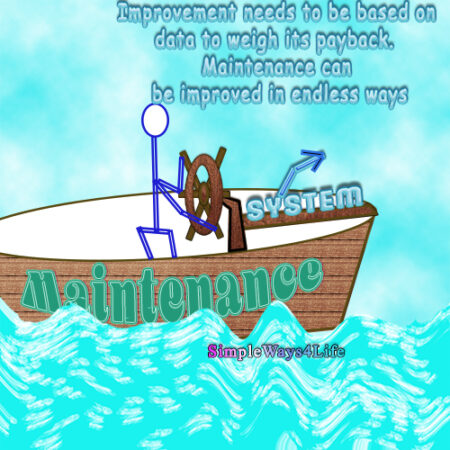As we had discussed in the last chat; To be systematic this means that you follow a fixed plan, system or methodology. In that chat we focused on the targets and planned achievements as a result of your plan. Those expected resulting achievements help you in two ways. The first one, you trust the process specially when it is lengthy and and consuming a lot of resources. Resources here refers to the most precious one; The manhours or the time available for the team to do some work. Time when passes never return back. So when you consume this valuable time in an activity like RCM analysis, you do so because you expect that result is rewarding.
Systematic planned route and ammo depend on your destination
The second support from clear targets and planned achievements is the path. To know whether you will go right or left on the next crossing, you need to be clear about where you are going. Moreover, you have the complete route planned ahead. You might select this specific route with all the sewed stops and turns for many reasons. It may be the shortest, the fastest, having less tolls, less traffic or used to it. Depending on your transportation method, you may look for more charging stations. Also if you will pick someone/something along the road or your favorite coffee shop is in that route this shapes your route. Here you became clear on two things; Your targets and why you had selected this specific route.
Being clear at your targets and at the reasons for selecting those steps to reach the target prevents you from going stray during driving. Moreover, you can guide others and explain to them the route and why you are on it. Following this route repeatedly will add it to your subconscious routines that run autonomously.
While setting up your route you care about what is important to take it with you. If you are heading for work, then maybe you need to remember the report you were working on yesterday night. Also remember the work ID to open the door, the driving license or the bus card. Maybe your coffee heated mug or your lunch are equally important. While if you were heading for a picnic or a mountain juggle, you might prepare differently.
Being Systematic in your maintenance
Same applies for your maintenance activities. When that task you are heading for is related to greasing, the preparations are different from when you are going to change a filter or a sensor. This also differs if you are going to troubleshoot a failure that is currently stopping the production line. Also, you will have a different mind set when you are going for an inspection round or some predictive maintenance measurements.
For the personal activities, mostly you are the planner and the executor. So, it is your goal and your plan and your route. However in maintenance, mostly you are one of three main characters. A team member who executes the plan. Or, the planner who draws the steps to reach the target. And, you might be the supervisor who oversees all of this. The planner and the supervisor put much of their attention and focus on ensuring that the maintenance team is following the maintenance plan in general. More specifically, that in each task the maintenance team is following the prescribed steps. Often, any failure that comes after a maintenance activity is referred to ignorance of following the maintenance plan or procedure.
The ultimate target is to reach a systematic maintenance where the maintenance team follows a fixed maintenance plan. So within some time the maintenance team would excel performing the tasks as required. “As required” here refers to how it was written in the plan. To make a plan that is comprehensive and encompasses all the needed details you can refer to our training courses below.

BESTPRICE-TILL-17FEB

BESTPRICE-TILL-17FEB
How “fixed” is a fixed plan?
As I was taught, you should strictly follow the guidelines in the first place. Then with time, experience increase, growing awareness of the subject occurs and, problems or short comings appear. Just then we can discuss the plan. This might look easily said than done but actually it depends on the supervision and the commitment.
When we are rolling out a new task or an update of a task, we need to be attentive to the first couple of executions. Some tasks when planned at desk or in the meeting room might seem obvious. However, when the real execution starts, some obstacles might prevent the execution altogether. That’s why we need to be flexible with the new tasks till they are executed successfully for one or two times.
The actual results, benefits or problems arising from a maintenance task will appear after a reasonable data collection period. During this period the team will execute the task as written without any modification. That’s not a call for being stubborn; That’s the only way to collect relevant results. Otherwise if every team is executing the task differently at every time, then the collected data can’t be used to judge the task. Moreover, Maintenance is not systematic anymore. So we need to balanced between fixed plans i.e. systematic and the flexibility of tuning the tasks for the best results.
Systematic maintenance that is not set in stone will yield the best results on the long run. We would be able to collect valuable data from the consistency. Then, we are flexible enough to adjust, change or cancel a maintenance task completely.
Systematic personal tasks
We had discussed in the beginning the personal plans and the roles we play in each plan. We are the planners and the execution team. However, in most either we miss the supervision role or exaggerate in it that it. When we overlook the review and supervision of our tasks we miss the chance to tune our plans or to a detour to a better route. While if we exaggerate in supervision and control then we diminish our enthusiasm for the task. It ends as if it is set in a stone with an internal guard from our ego that prevents any chance for change.
Unfortunately, those personal traits are reflected on our attitude or aptitude in the work place. Whomever who do things every time differently, will try to escape any systematic tasks at work. And those who set their personal plans in stone are more biased to the original plan of the tasks than the planner himself.
In Conclusion,
Being Systematic has a lot of benefits on the personal and professional level. However, the clear fixed plan should not be set in stone. We need to balanced between fixed plans i.e. systematic and the flexibility of tuning the tasks for the best results.
If you feel you need help with any of these ideas we discussed, request a Management Consultancy or Coaching Services From our Store








